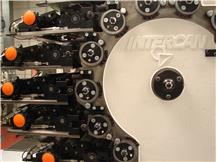Our managing director Peter Strode recently featured in the trade press, where he spoke about his life in can making, and the birth of Intercan Group. You can read the article below:
THE JOURNEY NOT THE DESTINATION
Alex Fordham speaks with Peter Strode about his 33 years within the can making industry, and his reflections of an industry that
he believes is about people first and foremost.
We’re approaching two years since SLAC Precision Equipment acquired Intercan Group, the metal decorating provider, notable for its IPP8 beverage can and aerosol proofing machine. Under the agreement, Peter Strode, owner of Intercan, has continued as managing director. As we chat about his 33 years within the industry, despite selling his company, it appears Peter is happy with his lot, and genuinely excited for his remaining years within the can making business.
As one of the industry’s true characters, there’s probably a can making autobiography to be had one day about his tales of travelling the globe in this funny old industry of ours, working hard and playing harder.
So what better way to while away an hour, than hearing a few tales of can making from years gone by to this relative novice. We talk Luton Town Football Club (Peter’s lifetime football team), can making dinner guests, sleepless nights of running an independent business, and run-ins with the Mafia.
I hope you enjoy reading this as much as I enjoyed writing it.
THE BEGINNING
Alex Fordham: Just to kick things off, you must have an amusing story or two? One that is at least printable?
Peter Strode: One that sticks in my mind is how I got into the business in the first place.
I didn’t know anything about the industry initially, it was all new to me. All I knew about was sales and exporting really. And engineering in general.
A friend of mine was in engineering and he had done a bit of work for a can plant and he said: “I have this enquiry for Germany, what do I do? I need to export and get paid”.
So I gave him some advice and we decided there may be some form of business opportunity there that we could develop.
We took a week’s holiday to Germany and did some research. This was pre-internet days of course, so it was relatively hard to do research. We tried to do some research on can companies and who makes cans; we had some success, but it was limited.
One place we went to was a can making company in Seesen, Germany. When we got there our hearts dropped as we had made all the effort to get there, and when we turned into where we thought this place was, it was a derelict old warehouse.
We looked at each other and thought this isn’t the start of a mega business! There was a guardhouse there though, so we knocked on the door and there was this bloke who only spoke German, funnily enough. So we were doing our best German impression: “Seesen, dosen, bitte?”
He said wait, and he went away for 30 minutes. I thought what a waste of time, I’d rather be down the pub sort of thing. There’s some good bars in Germany, as I’m sure you’re well aware.
AF: Yes I’ve visited a few in my time, as I’m sure you have.
PS: Anyway, the bloke comes back with someone who speaks English, and we said: “Sorry to bother you, do you make cans here as we are in that business and Seesen are famous for cans”.
He started grinning: “We stopped production here 20 years ago – I used to work here!”
However, he gave us some names in passing, which when we further researched actually helped us. But as a start of a business, to turn up somewhere that hadn’t been in business for 20 years, things could only improve.
STARTING UP
AF: When you started, did you foresee a career in can making? Or see it as a short term means to an end?
PS: When you start anything new, you would be wrong to say “Ah, this is me, I’m going to make things work, and I’m going to be a millionaire by the time I’m 30”. Things just don’t quite work like that.
How I worked was day to day, react a little, plan a bit, react to what the customers want, move on. You employ someone if you need to, but get ready to let people go if you don’t need them, as business can go both ways.
So we always kept ourselves flexible. We could have contracted out, and expanded if we wanted to. That’s the key to a small business really, being able to do that. Some companies grow, then they don’t have any choice. I would suggest many in our industry did that. They got too big, and couldn’t find a way of halving everything, as you can’t turn it on and off like a tap.
AF: Like the craft beer market I assume? Careful what you wish for?
PS: Yes, what do you want? Do you want to be an independent brewer, or a multi-national numbers factory? And are you any good at it anyway?
AF: So where did Intercan sit? More as the independent brewer, if we’re using that as the analogy?
PS: Yes, in that respect Intercan gave me a lifestyle I enjoyed, good experiences, a lot of worry and nervous times, but it created relationship with customers and suppliers that allowed us to be where we are now.
We reacted what the customer wanted and worked with them to achieve that end, rather than here is the machine, this is what it costs, and do you want to buy it?
BUILDING RELATIONSHIPS
AF: Are there any relationships you had when you first started that you still have now?
PS: I would say Bunting and TD Wright are the two. We still deal with them now, and we did right back from the first year of business.
To be a major customer of those companies, for the length of time we are talking, for the products we buy, has been fantastic. We have been a major outlet for them, and it’s given me great satisfaction.
AF: Intercan has always struck me as a company that values customer relationships...
PS: Of course, the key is the relationship with the customers; the customers haven’t instructed us how to grow the company, as that’s down to us. However, they’ve guided us in what new products they are looking for, and the areas of improvement they want. We are lucky to be in an industry that has gone from strength to strength.
As we came into it from an entrepreneurial point of view, we have always had an open outlook on things. Rather than some of our competitors that had been around for some years and entrenched in their way of doing things.
AF: Is that still the case now?
PS: There is a hangover from it, but because of people like us, they have had to adapt and grow. And they’ve had to change quite a lot. At one point, there was no flexibility out of some suppliers – they had their products. They were stronger than their customers almost! Things have certainly changed for the better.
SLEEPLESS NIGHTS
AF: During your 30 years, the marketplace has been consolidating all the time. Were there any sleepless nights about being a standalone independent company?
PS: There were lots of sleepless nights, but I laugh at it now. There were rumours of Mafia money, laundering money into the can making industry. I didn’t go into the American market for the first 15 years, as I was worried about getting my knee caps blown off! Now I’ve got bad knees, it doesn’t matter!
In all seriousness, there are always sleepless nights running your own business, but the good always outweighed the bad.
ARRIVING ON THE SCENE
AF: What has been the best day in your business life?
PS: We started the business cross-referencing, copying, manufacturing and supplying spare parts, rather than manufacturing other people’s machines. I’m not embarrassed by that, I don’t make a secret of that.
We developed a lot of our own equipment over the years, a lot of our own ideas, and we developed something for a decorator that we installed down in the South of France.
While I was there, two guys from a high profile company were having a meeting with the plant, on far bigger subjects than I was entertaining.
The following day I went into the plant early one morning, starting to work installing this bit of equipment, and one of the guys was climbing all over the machine, measuring our piece of equipment. They were copying our piece of equipment; I thought I’ve arrived!
He embarrassingly put his tape measure in his pocket and said: “Morning Peter, you’re in early!”
AF: Imitation is the sincerest form of flattery I suppose. I just want to touch upon your staff; it sounds like a number of your team have been with you for a long time?
PS: I’ve learnt people are your most important asset; if you get the right people it’s easy. What will make my retirement more comfortable when it comes is, because of her dedication and commitment, Marion (Dumbleton, Intercan general manager), has built up knowledge, and customers have built confidence in her. Intercan will go on with her ethos – that gives me a lot of comfort.
Most of our staff are long term employees, well paid and do a good job. I’ve been very lucky.
THE ACQUISITION
AF: When selling to SLAC was it bittersweet, or aren’t you nostalgic like that?
PS: I’m very nostalgic and I would have shed a tear if SLAC bought it to shut it down, but they haven’t. As it hasn’t gone that way – as opposed to other companies, who were bought primarily for the technology and knowledge.
Part of the key for me was Intercan carrying on. I get satisfaction that there are Intercan machines out there that will be working long after I’m not here. That’s quite a legacy in itself.
AF: Over the years you must have met some interesting characters within the industry; who would be your ideal dinner party guests from the industry? I’ll give you three.
PS: I’ve made a lot of acquaintances, and a lot of friends, and of those friends, a lot are gentleman. It’s a lightly used word these days, but there are a few. To pick three is unfair, but:
Jim Abbott, Tony Rimmer (founder CCH), and Dave McEachern (TD Wright).
THE FUTURE
AF: So how does the industry compare to when you started?
PS: The best days are yet to come, absolutely. The 1980s wasn’t a golden age, but an era when there was a lot of potential and small explosions of businesses in the industry. However, the potential within the industry is still quite exciting.
The industry needs to hang its hat on the fact that metal is a very renewable and sustainable resource, and at the moment, it doesn’t have anything close to competing with it as a material.
That’s what will keep the industry going. Young interest is also important, and automation and the AI side of things too.
I’ve learnt that training is an ongoing thing, as the next generation is always coming along. It’s important if we are going down the route of how we are getting the next generation into a potentially boringly-viewed industry. We are lucky we have the environmental aspect that youngsters have taken on board.
The future has never looked brighter for the industry; it has kept me interested for over 30 years, and long may that continue.
•This article appeared in CanTech International May 2019.





